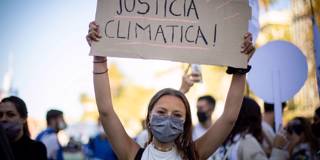Much has happened since my dear and much-missed friend Desmond Tutu (“Arch”) and I wrote this commentary in 2011. The world recorded its warmest decade ever. Leaders have gathered time and again to discuss climate change. And nine climate COPs have come and gone, with promises made and promises broken.
It is crushing that everything we called for more than ten years ago continues to ring even truer today. As millions around the world bear the devastating effects of the climate crisis, with those in poorer countries disproportionately affected, I ask again: What will it take to see real action?
There can be no more empty promises. Rich countries must deliver financial support for the most vulnerable countries, and political leaders must not act out of self-interest but for all people and future generations.
We cannot fall into despair. One of the great lessons Arch taught us was to seek out the goodness in the world. As people continue to rise up, devise innovative solutions, and demand more from their leaders, we can and must find hope in solidarity and action.
Alongside my fellow Elders, I remain inspired by everything Arch stood for, and we will continue fighting for a just future for all. – Mary Robinson, Summer 2022
DURBAN – Before the Copenhagen climate-change summit two years ago, the two of us sat together in Cape Town to listen to five African farmers from different countries, four of whom were women, tell us how climate change was undermining their livelihoods. Each explained how floods and drought, and the lack of regular seasons to sow and reap, were outside their normal experience. Their fears are shared by subsistence farmers and indigenous people worldwide – the people bearing the brunt of climate shocks, though they played no part in causing them.
Now, two years later, we are in Durban, where South Africa is hosting this year’s climate-change conference, COP17, and the situation for poor people in Africa and elsewhere has deteriorated even further. In its latest report, the United Nations Intergovernmental Panel on Climate Change concludes that it is virtually certain that, in global terms, hot days have become hotter and occur more often; indeed, they have increased in frequency by a factor of ten in most regions of the world.
Moreover, the brutal paradox of climate change is that heavy precipitation is occurring more often as well, increasing the risk of flooding. Since 2003, East Africa has had the eight warmest years on record, which is no doubt contributing to the severe famine that now afflicts 13 million people in the Horn of Africa.



It is crushing that everything we called for more than ten years ago continues to ring even truer today. As millions around the world bear the devastating effects of the climate crisis, with those in poorer countries disproportionately affected, I ask again: What will it take to see real action?
There can be no more empty promises. Rich countries must deliver financial support for the most vulnerable countries, and political leaders must not act out of self-interest but for all people and future generations.
We cannot fall into despair. One of the great lessons Arch taught us was to seek out the goodness in the world. As people continue to rise up, devise innovative solutions, and demand more from their leaders, we can and must find hope in solidarity and action.
Alongside my fellow Elders, I remain inspired by everything Arch stood for, and we will continue fighting for a just future for all. – Mary Robinson, Summer 2022
DURBAN – Before the Copenhagen climate-change summit two years ago, the two of us sat together in Cape Town to listen to five African farmers from different countries, four of whom were women, tell us how climate change was undermining their livelihoods. Each explained how floods and drought, and the lack of regular seasons to sow and reap, were outside their normal experience. Their fears are shared by subsistence farmers and indigenous people worldwide – the people bearing the brunt of climate shocks, though they played no part in causing them.
Now, two years later, we are in Durban, where South Africa is hosting this year’s climate-change conference, COP17, and the situation for poor people in Africa and elsewhere has deteriorated even further. In its latest report, the United Nations Intergovernmental Panel on Climate Change concludes that it is virtually certain that, in global terms, hot days have become hotter and occur more often; indeed, they have increased in frequency by a factor of ten in most regions of the world.
Moreover, the brutal paradox of climate change is that heavy precipitation is occurring more often as well, increasing the risk of flooding. Since 2003, East Africa has had the eight warmest years on record, which is no doubt contributing to the severe famine that now afflicts 13 million people in the Horn of Africa.